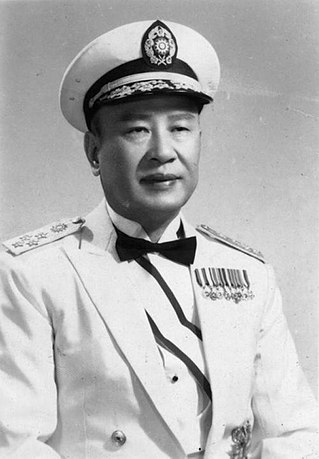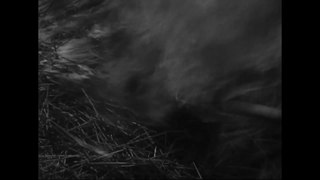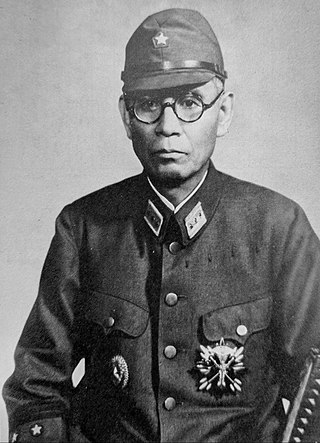
Chiang Kai-shek was a Chinese politician,revolutionary,and military commander who was the leader of the Nationalist Kuomintang (KMT) party and commander-in-chief and Generalissimo of the National Revolutionary Army (NRA) from 1926,and leader of the Republic of China (ROC) in mainland China from 1928. After Chiang was defeated in the Chinese Civil War by the Chinese Communist Party (CCP) in 1949,he continued to lead the Republic of China on the island of Taiwan until his death in 1975. He was considered the legitimate head of China by the United Nations until 1971.

Wang Zhaoming,widely known by his pen name Wang Jingwei,was a Chinese politician who was president of the Reorganized National Government of the Republic of China,a puppet state of the Empire of Japan. He was initially a member of the left wing of the Kuomintang (KMT),leading a government in Wuhan in opposition to the right-wing Nationalist government in Nanjing,but later became increasingly anti-communist after his efforts to collaborate with the Chinese Communist Party ended in political failure.

Li Zongren,courtesy name Telin,was a prominent Chinese warlord based in Guangxi and Kuomintang (KMT) military commander during the Northern Expedition,Second Sino-Japanese War and Chinese Civil War. He served as vice-president and acting president of the Republic of China under the 1947 Constitution.

Bai Chongxi was a Chinese general in the National Revolutionary Army of the Republic of China (ROC) and a prominent Chinese Nationalist leader. He was of Hui ethnicity and of the Muslim faith. From the mid-1920s to 1949,Bai and his close ally Li Zongren ruled Guangxi province as regional warlords with their own troops and considerable political autonomy. His relationship with Chiang Kai-shek was at various times antagonistic and cooperative. He and Li Zongren supported the anti-Chiang warlord alliance in the Central Plains War in 1930,then supported Chiang in the Second Sino-Japanese War and the Chinese Civil War. Bai was the first defense minister of the Republic of China from 1946 to 1948. After losing to the Communists in 1949,he fled to Taiwan,where he died in 1966.
This article is concerned with the events that preceded World War II in Asia.

The Reorganized National Government of the Republic of China,commonly described as the Wang Jingwei regime,was a puppet state of the Empire of Japan in eastern China. It existed coterminous with the Nationalist government of the Republic of China under Chiang Kai-shek,which was fighting Japan alongside the other Allies of World War II. The country functioned as a dictatorship under Wang Jingwei,formerly a high-ranking official of the Nationalist Kuomintang (KMT). The region it administered was initially seized by Japan during the late 1930s at the beginning of the Second Sino-Japanese War.

Operation Ichi-Go was a campaign of a series of major battles between the Imperial Japanese Army forces and the National Revolutionary Army of the Republic of China,fought from April to December 1944. It consisted of three separate battles in the Chinese provinces of Henan,Hunan and Guangxi.

The proposed Japanese invasion of Sichuan was the Imperial Japanese Army's failed plan to destroy the Republic of China during the Second Sino-Japanese War. It was to be a stepping stone for the Empire of Japan's final control of the Chinese mainland.

The Battle of China (1944) was the sixth film of Frank Capra's Why We Fight propaganda film series.

Zhang Zhizhong or Chang Chih-chung was a Chinese military commander and politician,general in the National Revolutionary Army of the Republic of China and later a pro-Communist politician in the People's Republic of China.

Sun Yuanliang was a Chinese military general of the National Revolutionary Army of the Republic of China. Sun was the last surviving member of the first graduating class of the Whampoa Military Academy,as well as the last surviving army-level commander of the Second Sino-Japanese War. His career spanned the January 28 Incident,Second Sino-Japanese War and the Chinese Civil War.

Long Yun was governor and warlord of the Chinese province of Yunnan from 1927 to October 1945,when he was overthrown in a coup by Du Yuming under the order of Chiang Kai-shek.

Yasuji Okamura was a general of the Imperial Japanese Army,commander-in-chief of the China Expeditionary Army from November 1944 to the end of World War II,and appointed to surrender all Japanese forces involved in the China Burma India theater. He was tried but found not guilty of any war crimes by the Shanghai War Crimes Tribunal after the war. As one of the Imperial Japanese Army's top China experts,General Okamura spent his entire military career on the Asian mainland.

Zhang Fakui was a Chinese Nationalist general who fought against northern warlords,the Imperial Japanese Army and Chinese Communist forces in his military career. He served as commander-in-chief of the 8th Army Group and commander-in-chief of NRA ground force before retiring in Hong Kong in 1949.

Guan Linzheng was a Republic of China general who fought against the Chinese Communists and the Imperial Japanese Army during his career. Guan was a recipient of Order of Blue Sky and White Sun,the highest honor for a Chinese Nationalist commander.

Li Jishen or Li Chi-shen was a Chinese military officer and politician,general of the National Revolutionary Army of the Republic of China,Vice President of the People's Republic of China (1949–1954),Vice Chairman of the National People's Congress (1954–1959),Vice Chairman the Chinese People's Political Consultative Conference (1949–1959) and founder and first Chairman of the Revolutionary Committee of the Kuomintang (1948–1959).
Events in the year 1941 in China.
Events in the year 1939 in China.
Events from the year 1945 in the Republic of China. This year is numbered Minguo 34 according to the official Republic of China calendar.

Qu Wu was a Chinese military officer and politician,who most notably served as chairman of the Revolutionary Committee of the Chinese Kuomintang,Vice Chairman of the Chinese People's Political Consultative Conference,deputy secretary-general of the National People's Congress,deputy secretary-general of the Central People's Government and vice chairman of the Committee of Foreign Cultural Relations.
















